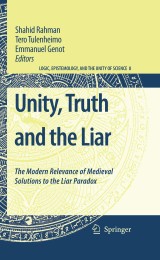Details

Unity, Truth and the Liar
The Modern Relevance of Medieval Solutions to the Liar ParadoxLogic, Epistemology, and the Unity of Science, Band 8
|
149,79 € |
|
| Verlag: | Springer |
| Format: | |
| Veröffentl.: | 27.09.2008 |
| ISBN/EAN: | 9781402084683 |
| Sprache: | englisch |
| Anzahl Seiten: | 338 |
Dieses eBook enthält ein Wasserzeichen.
Beschreibungen
Andinmy haste, I said: “Allmenare Liars” 1 —Psalms 116:11 The Original Lie Philosophical analysis often reveals and seldom solves paradoxes. To quote Stephen Read: A paradox arises when an unacceptable conclusion is supported by a plausible argument from apparently acceptable premises. [...] So three di?erent reactions to the paradoxes are possible: to show that the r- soning is fallacious; or that the premises are not true after all; or that 2 the conclusion can in fact be accepted. There are sometimes elaborate ways to endorse a paradoxical conc- sion. One might be prepared to concede that indeed there are a number of grains that make a heap, but no possibility to know this number. However, some paradoxes are more threatening than others; showing the conclusiontobeacceptableisnotaseriousoption,iftheacceptanceleads to triviality. Among semantic paradoxes, the Liar (in any of its versions) 3 o?ers as its conclusion a bullet no one would be willing to bite. One of the most famous versions of the Liar Paradox was proposed by Epimenides, though its attribution to the Cretan poet and philosopher has only a relatively recent history. It seems indeed that Epimenides was mentioned neither in ancient nor in medieval treatments of the Liar 1 Jewish Publication Society translation. 2 Read [1].
Disputatio.- The Truth Schema and the Liar.- Read and Indirect Revenge.- Tarski's Hidden Theory of Meaning: Sentences Say Exactly One Thing.- Doubting Thomas: From Bradwardine Back to Anon.- Logic Without Truth.- Scheming and Lying.- Comments on Stephen Read's “The Truth-Schema and the Liar”.- Models for Liars in Bradwardine's Theory of Truth.- On a New Account of the Liar.- The Liar Cannot Be Solved.- Out of the Liar Tangle.- Read about T-Scheme.- Further Thoughts on Tarski's T-scheme and the Liar.- Historical Background: Restrictionism versus the Manifold Theory of Meaning.- Restrictionism: A Medieval Approach Revisited.- William Heytesbury and the Treatment of Insolubilia in Fourteenth-Century England Followed by a Critical Edition of Three Anonymous Treatises De Insolubilibus Inspired by Heytesbury.
<P>The Liar Paradox challenges logicians’ and semanticists’ theories of truth and meaning. Modern accounts of paradoxes in formal semantics offer solutions through the hierarchy of object language and metalanguage. Yet this solution to the Liar presupposes that sentences have unique meaning. This assumption is non-controversial in formal languages, but an account of how “hidden meaning” is made explicit is necessary to any complete analysis of natural language. Since the Liar Paradox presents itself as a sentence uniting contradictory meanings, appreciating how they can be united in a single sentence may provide new insights into this and other paradoxes.</P>
<P>This volume includes a target paper, taking up the challenge to revive, within a modern (formal) framework, a medieval solution to the Liar Paradox which did not assume Uniqueness of Meaning. Stephen Read, author of the target paper, attempts to formally state a theory of truth that dates back to the 14th century logician Thomas Bradwardine; the theory offers a solution to the Liar Paradox in which the Liar sentence turns out to be false. The rest of the volume consists of papers discussing and/or challenging Read’s – and Bradwardine’s -- views one the one hand, and papers addressing the doctrinal and historical background of medieval theories of truth on the other hand. It also includes a critical edition of Heytesbury’s treatise on insolubles, closely related to Bradwardine’s view.</P>
<P>Including formal, philosophical and historical discussions, this volume intends to renew the debate about paradoxes and theory of truth, and to show that the interest of earlier medieval work is not merely historical but, on the contrary, still relevant for modern, formal semantic theory. It is of interest for both professional philosophers and advanced students of philosophy.</P>
<P>This volume includes a target paper, taking up the challenge to revive, within a modern (formal) framework, a medieval solution to the Liar Paradox which did not assume Uniqueness of Meaning. Stephen Read, author of the target paper, attempts to formally state a theory of truth that dates back to the 14th century logician Thomas Bradwardine; the theory offers a solution to the Liar Paradox in which the Liar sentence turns out to be false. The rest of the volume consists of papers discussing and/or challenging Read’s – and Bradwardine’s -- views one the one hand, and papers addressing the doctrinal and historical background of medieval theories of truth on the other hand. It also includes a critical edition of Heytesbury’s treatise on insolubles, closely related to Bradwardine’s view.</P>
<P>Including formal, philosophical and historical discussions, this volume intends to renew the debate about paradoxes and theory of truth, and to show that the interest of earlier medieval work is not merely historical but, on the contrary, still relevant for modern, formal semantic theory. It is of interest for both professional philosophers and advanced students of philosophy.</P>
Provides a formal reconstruction of several medieval theories of truth, demonstrating their relevance to modern research Approaches the discussion about truth theory and paradoxes from a semantical, logical and a historical perspective Contains critical editions of the medieval sources of the insolubilia, such as Heytesbury’s treatise on Insolubles (14th century), with introduction and notes Revives the debate on the Liar Paradox Entirely written in dispute style

















